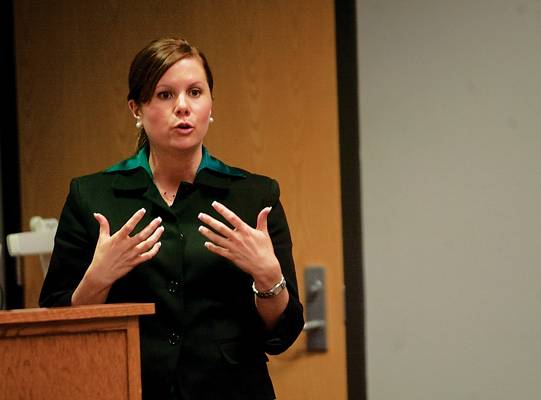Candidate shares strategy for dealing with crises

Amy Long, candidate for director of student assistance presents her strategy for a successful student intervention during an open forum on Tuesday in Martin Hall. Long is currently the greek leadership advisor at the University of Oregon and is one of three candidates for the position. Photo: Valerie Allen/iowa State Daily
April 27, 2009
The first in a series of three candidates vying for the position of director of student assistance outlined how she would handle crises on campus in an open forum Tuesday afternoon.
Amy Long, greek leadership adviser for the University of Oregon and candidate for director, presented her “Strategy for a Successful Student Intervention” Tuesday in 2121 Martin Hall.
According to a vacancy announcement, the Director of Student Assistance is “responsible for coordinating emergency response from the Dean of Students Office, including coordination of the university’s crisis response plan and coordinating response to sexual assault victims.”
Being director can sometimes be stressful, however, Long said she looks forward to helping students through crises.
“I’m passionate about being able to serve in a capacity where I can, if possible, help students to overcome the situation that they’re involved in,” Long said. “The most successful thing at the end of the day is just knowing you’ve done your best to try to help that student.”
Long’s plan was a five-step strategy. Her “five key strategies for success” were approach to crisis response, collaboration, intervention in action, assessment, and follow-up.
Long’s approach to crisis involved communicating with a broad range of constituents and venues, keeping information consistent, providing information that is easy to understand and accessible and using training to inform staff and faculty of protocols for reporting information, warning signs and intervention strategies.
“The key to overall success is a community based response,” Long said.
Long’s second strategy, collaboration, was based on networking with university staff and faculty and community partners. Long said she has already talked to the Department of Public Safety and the Story County Sexual Assault Response Team in Ames.
In intervention in action, Long said, it is essential to build trust and to be caring when talking to a student who may have been a victim. Communication and approach toward the student must be taken into consideration.
“It’s important to listen to what’s going on in the intervention,” Long said. “I think it’s so crucial to not promise anything to students that you cannot back up.”
In the assessment portion of the presentation, Long talked about looking at the big picture. It is important to understand the students involved and to gain knowledge of what may have taken place, she said. At this step, Long said, she would look at future risk reduction. When trying to understand the big picture, Long said, developing standard operating procedures for receipt of information is necessary to prevent information from getting lost.
Long’s last strategy was to follow-up with students as well as staff after the incident. These follow-ups include meeting with staff to debrief the situation and the intervention strategy as well as offering students opportunities for them to be away and to regain balance. Follow-ups also check on the well being of the students involved.
Long said, during this part of the process, it is crucial to fill out an accurate report. These reports need to be done immediately after the intervention so information doesn’t get lost.
Amy Long
Amy Long currently works at the University of Oregon in Eugene as the greek leadership adviser. She has a Bachelor’s in broadcast journalism and a Master’s in college student personnel services from Western Illinois University. She also previously worked at Luther College in Decorah as interim director of residence life and area coordinator of residence life. Long volunteered for Sigma Kappa National Sorority as national director of membership development.
More open forums for director of student assistance
1 p.m. Wednesday in room 136 of the Union Drive Community Center
Keith Robinder, former director of student life and community engagement, Laramie County Community College, Cheyenne, Wyo.
1 p.m. Friday in room 136 of the Union Drive Community Center
Roy Kammer, assistant professor of health science, director of alcohol and drug studies, Minnesota State University, Mankato, Minn.






